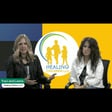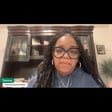Become a Creator today!Start creating today - Share your story with the world!
Start for free
00:00:00
00:00:01

Episode Eleven: Grief, Dying, and Parenting
Death and dying are a natural part of life, but the grief that comes with it can feel overwhelming and disrupt our lives.
If you are a parent who has suffered a deep loss, trying to keep normalcy in your life - especially for children - can be extremely difficult.
Grief counselor, educator, and recognized grief expert Elizabeth Schandelmeier shares advice for parents juggling simultaneously grieving and caretaking after dealing with significant losses.
This episode is dedicated to my nephews, Jaden and Gavin, and their wonderful mom, Rachel.
Transcript
Intro & Disclaimer
00:00:08
Speaker
Welcome to the Guardians of Hope podcast, where we bring together parents, nonprofits, legal and medical experts dedicated to positively impacting children's lives. Before we begin, this content should not be used as legal or medical advice.
00:00:24
Speaker
The purpose of this podcast is to inform and unite. So please seek advice from your attorney or doctor to address your specific needs. The thoughts and opinions of my guests are not necessarily my own. This is a platform for sharing.
Meet Elizabeth Schendelmeyer
00:00:40
Speaker
My next guest is a grief counselor, educator, and recognized grief expert. Elizabeth Schendelmeyer has over a decade of specialized experience supporting families,
00:00:52
Speaker
medical professionals and communities through death, dying, grief, and other significant losses. Elizabeth, welcome. Thank you so much for joining me. Oh, I really appreciate being here today. Thanks for having me. Thank you. So why don't we start by telling everyone about your work, how you got started, who you work with, and just a little bit of your history.
Career Transition to Grief Counseling
00:01:16
Speaker
Sure. Well, I've had a bit of a meandering path to get to where I am. Before having kids, I worked as a technical writer and started up communications departments for software engineering. And after my kids sort of grew and started going to school, I'd think about what I wanted to do next. And I felt like I wanted to do something that was a little bit more meaningful to myself. And so I went into
00:01:44
Speaker
The food industry actually went back to culinary school and then started my own business as a personal chef. I worked in a few kitchens and what started happening was I developed a sort of crowd of folks who would come to me with medical histories. I was working with a farmer.
00:02:05
Speaker
And so everything that we were doing was farm fresh. And it was at a time when people were really looking very seriously at using food to address health issues.
00:02:17
Speaker
And so that was really fascinating and I really enjoyed being able to support people through health but I began to wonder what does it look like to support and nourish people through death and dying. So I started volunteering with a hospice agency and I realized that that was really my heart work actually. So I wound up returning to school. Once again I got my master's degree in social work
00:02:47
Speaker
and then started very specifically at a level one trauma hospital that did transplant. And I was on the palliative team there where we would provide a supportive presence for families who were moving through all kinds of very serious medical situations. And from there I spent a few years doing that and that was really amazing work.
Role as Bereavement Counselor
00:03:14
Speaker
I'm now a bereavement counselor for a local hospice agency. I work with individuals and families certainly through bereavement but also do preparatory support and that's supporting people who are dying and then anticipatory support for the folks who are supporting the person who is dying. So I work with all ages and
00:03:40
Speaker
before, during, and after death. And then I have a small private practice where I work exclusively with people who are grieving or moving through their own chronic or terminal illness or families who are living with somebody, moving through their own terminal illness. So it's been really wonderful work. I'm also in charge of our children's programming through our hospice agencies. So I have the chance to really think about what kids move through when they're grieving.
00:04:11
Speaker
It sounds very rewarding.
00:04:14
Speaker
It is, actually. People sometimes wonder if my job is very gloomy, and really, it's incredibly enriching. For my own life, it's a great reminder that time is short, but also, it's a real honor to be invited into this very intimate space in a family's life, and also, you know, very uplifting to help them try to find as much life as they can in the time that they have. So, it is extremely rewarding work.
00:04:44
Speaker
Absolutely.
Understanding Grief
00:04:45
Speaker
Can you tell us how grief affects us emotionally? Yeah, so there's so much to talk about grief in the news these days. Talking about grief is a disorder. I get lots of calls and questions about that.
00:05:00
Speaker
But the truth of the fact is that that particular kind of thinking about grief applies to very, very, very, very few people. Grief in and of itself is a very natural, very normal part of the human experience. It's our reaction to loss and change. When somebody who's important or significant in our life dies,
00:05:23
Speaker
Usually it brings with it a lot of change and so it's our process of coping through that change and adjusting to the loss. But it's a very normal and natural process that really just sort of reflects everything that it means to be human.
00:05:42
Speaker
One of the things that I think sometimes folks forget is that grief is a full body experience. It is in our emotional self. It's our intellectual self, our psychological self, our spiritual self. So there's lots of symptoms and side effects of grief that can be surprising for folks. Understandable.
00:06:05
Speaker
And this podcast here is dedicated or focused on child advocacy and helping parents along
Grieving Parents: Ensuring Stability
00:06:14
Speaker
the way. So what support or advice do you have for parents grieving and caring for children?
00:06:20
Speaker
at the same time. Yeah, it's really tough when I speak to parents. You know, not only are they dealing and coping with their own grief, but they are also grieving on behalf of their children. Parents never like to see their children have to experience anything that is painful and grief is or can be extremely painful.
00:06:43
Speaker
So it's hard on parents, but also parents are not at the center of their own grief experience, especially if the children are dependent on them. They have to sort of keep it together in order to continue to care for their kids. And so often parents are pretty exhausted.
00:07:00
Speaker
by the whole experience. One of the first things that I remind parents is that kids do not grieve in the same way that adults do. Children are not just little mini adults. And so sometimes the behaviors or the reactions that we see in children can look a little bit different than in adults, especially depending on their age group and their developmental level.
00:07:29
Speaker
So sometimes this is about behaviors that are sometimes described as acting out. Sometimes kids can, when they're having these intense emotional experiences that they don't really know how to talk about, they don't really know how to handle.
00:07:46
Speaker
this can present itself as sometimes looks a little bit aggressive or withdrawn or moving back in their own development so you might see bed wetting again or what might feel like clinginess. These are all really normal for kids and it's really important for the most part for parents to help children feel safe
00:08:12
Speaker
and secure in their environment again again grief a lot of that is about change and so for children what they want to know is are they safe are they you know if something were to happen say for example it was a parent who died
00:08:27
Speaker
Children will often wonder, was it my fault? Is there something that I did? Or, you know, what would happen if my other parent died now that I know this is true? So the parent's role is really to provide as much sort of safety structure and stability as possible, given the circumstances. Thank you, Elizabeth, for that. Now, how do we tell our kids a loved one has passed away?
Explaining Death to Children
00:08:52
Speaker
We want to use as much concrete language as possible. Now,
00:08:57
Speaker
When I say this, of course, I'm not here to give anybody parenting advice or to tell them that their traditions and culture is not relevant to this area of working with our kids.
00:09:13
Speaker
The sort of advice that we tend to give is to use language that is very concrete. You know, talk about death and dying, not use words like passed away or this person got lost. As you can imagine, those words can be very confusing to a child. So we want to explain death in a way that children are able to understand. So a part of that, just as being aware of their developmental level and sort of their education level, what kind of vocabulary do they use?
00:09:42
Speaker
But we want to say things like, this person died and what that means is that their heart doesn't work anymore. They don't need to eat. They don't breathe. These kinds of things to explain sort of what it means to die. And I also sort of caution families to just be aware of the language that they use, even if it's spiritual or religious. Not to say that
00:10:12
Speaker
If this language is used, then it's unacceptable. That's certainly not the point. The point is just to be aware of any confusion that it might cause. And this is important because you'll often hear kids sort of reflecting back their understanding of what they've heard.
00:10:29
Speaker
Just as an example that off the top of my head working with a family where they told their young child that the grandfather had gone to sit with Jesus and they were a little bit surprised to hear a few weeks later this little boy saying he wanted to go sit with Jesus and that was pretty shocking for the family. Of course a little boy just meant that it sounded like a nice place to be and that's where his grandfather was and that's where he wanted to go. So just you know
00:10:58
Speaker
being aware and helping kids sort of work through their understanding and then just being available to answer whatever questions they might come up with and also just knowing that kids might ask the same question over and over and over and over again. And that's because they're really just trying to wrap their mind around what's happened in their life.
Maintaining Normalcy During Grief
00:11:22
Speaker
Mm-hmm, exactly Now this is something that comes up a lot in my family. I'm sure tons of families go through this we've faced a lot of loss recently in recent years and Going through the holidays anniversaries and birthdays can be very trying times What are some ways? parents can cope during these holidays or anniversaries birthdays to
00:11:50
Speaker
Create some sort of normalcy or stability, like you said. Sure. We can even start with, for example, the ritual of funerals and that tradition in any of these very important times that mark important
00:12:09
Speaker
dates in our lives and help us mark the passage of a time as well. As much as you can involve the children in your life in creating these celebrations, the more they can feel included, the more they can feel a part of it, the more they can celebrate and have permission to express themselves, I think
00:12:34
Speaker
the better off they will be. I had somebody send me a picture of a funeral that was being held where the father had quite a few young children and they had decided to use a casket that was made of a very simple plain wood and for the visitation
00:12:56
Speaker
They actually put the casket in the middle of the room and left out all kinds of paint and markers for the children to come and decorate the box and write messages to say goodbye to their father. Now, I'm not saying that that's the right idea for everybody. It certainly would be a challenge for lots of families. But it's just one example that there aren't really any rules. So it really just depends on what your family is comfortable with.
00:13:25
Speaker
And how accepting they are of this sort of flexibility that you need to have if you're working with kids, right? They may say they want to do something and then get there and be afraid to stand up and speak or be feeling intimidated by the atmosphere or feel emotionally overwhelmed. So, you know, allowing your child to
00:13:46
Speaker
sort of be where they are and being okay with things working out, maybe having a plan B or a plan C or even a plan D is always a good idea.
00:13:58
Speaker
But definitely including your child, asking them what would they be comfortable with? What would they like to see? Would they like to put an extra plate at the dinner table for Thanksgiving where their grandfather always sat? Or would they like to hang a special ornament or light a special candle?
00:14:17
Speaker
or whatever that might be, choosing maybe one of the songs that plays at the reception or a memorial service. Any of these activities would be appropriate depending on the comfort level of the parent.
00:14:35
Speaker
I think another thing to remember is that as adults, we are modeling what grief looks like. And we want to make sure that our children understand that grief includes a wide range of emotions and that there's nothing wrong with maybe sometimes feeling angry, sometimes feeling sad, sometimes feeling lonely, sometimes feeling confused, that it's also okay to be happy. It's also okay to laugh.
00:15:03
Speaker
It's really important that children continue to get to play and hang out with their friends and that their life will continue to grow and evolve. So in all of this, you know, whatever the occasion.
00:15:19
Speaker
It's important for parents to be able to model having their own emotional response. We don't want our kids to have to take care of us, you know, we're the parent, but this is one way to encourage empathy and to allow them to support you. If you're feeling sad, it's okay to say, you know, I'm so sad that my dad's not going to be here today. And to have your child say, you know, I'm sad about that too. And I'm sad for you too, mom, and give you a hug. You know, that's a wonderful way for a child to learn how to empathize with others.
00:15:50
Speaker
Totally. That is such great advice, Elizabeth.
Seeking Professional Help
00:15:55
Speaker
The last thing I wanted to ask you is when should a parent seek help? Or if they notice behaviors in their child, when should they seek help on their behalf? That is a great question. And, you know, the answer sort of depends on what resources you have available.
00:16:16
Speaker
At the bottom line, one of the things that we really just want to remember and affirm is that grief in and of itself is a normal and natural response to loss. It is not a mental health condition, even though it feels like it sometimes. So even just being aware of that
00:16:34
Speaker
watching your kids, seeing if they have any challenges, making sure that you tell their school, making sure that you tell the daycare or the football team or the basketball team or anybody who touches your child's life should be aware that the child has experienced a major loss.
00:16:52
Speaker
And they should be reminded over time, too, because these schools or teams or whoever it is may or may not remember. They may not keep that in mind. And they may be observing behaviors that they don't understand look like grief. So I think the first place for parents to reach out to would be the school or community center or wherever their child is spending time.
00:17:16
Speaker
Other than that, often in many communities, there will be standalone grief centers that are specific for children, or maybe summer camps that are often free of charge, where kids can go. Sometimes they're for spend the night, sometimes they're for day camps, sometimes families go together, sometimes just the kids. These are really important because a part of the experience for children
00:17:45
Speaker
is that grief can be very isolating. If they're in their class, right, a lot of these kids are already feeling different because that's a part of being a kid, right, figuring out who you are and how you fit in. And so a child who is grieving
00:18:01
Speaker
often feels very isolated in that experience, unless of course they have lots of friends who happen to have gone through something similar and occasionally that happens. Usually a child's kind of alone in their own grief in their classroom and so finding a community for them of other children of similar age who are grieving can be very very supportive for kids.
00:18:25
Speaker
often kids are sort of resistant to going to what we might call a grief camp because it sure doesn't sound like a lot of fun but usually these camps or centers are run by people who really understand kids and really understand families and really understand grief and so they really try to bring as much joy and fun as possible into the experience while supporting and helping kids move through the process and also connect with other children who they have grief in common with and
00:18:56
Speaker
When we're talking about more serious concerns, seeking out a counselor, seeking out a therapist can be helpful. I would really encourage folks to make sure that the services that they are
00:19:13
Speaker
that they're engaging are well-informed about grief. Again, grief is not a mental health issue, so it's important that the professionals that you turn to are folks who really understand the difference between grief and other types of mental health diagnoses because they can be pretty easy to mix up if you're not familiar with how those things are different. As for the adults, you know, again, most people who are grieving
00:19:43
Speaker
will rely on their community, their support, their family, their faith community, whoever it is surrounding them, to help provide support and encouragement and lots of hugs and hopefully lots of empathy.
Community & Professional Support
00:20:00
Speaker
but you know again for a parent it can be pretty overwhelming because they're going through their own grief and trying to support kids through this and it's a lot so having somebody to talk to whether it's you know maybe maybe somebody in your faith community or again a counselor
00:20:18
Speaker
a therapist, somebody who really understands the process of grief can really help you kind of normalize and confirm that everything that you're going through sounds like it's well within the wide range of what we call normal and grief and can give you a little bit of confidence, maybe a few tips, maybe just a place to put some of that intense emotion so that you can keep it together to make dinner.
00:20:42
Speaker
So look for the support in your community that's available. There may be support groups as well, depending on the type of loss that you've experienced or even general support groups that are offered, for example, by hospice agencies, sometimes private groups or churches, community centers, things like that. Elizabeth, thank you so much for sharing your work with us and your advice to parents.
00:21:35
Speaker
It's been a pleasure talking to you about this topic. Thank you so much for having me today.



















